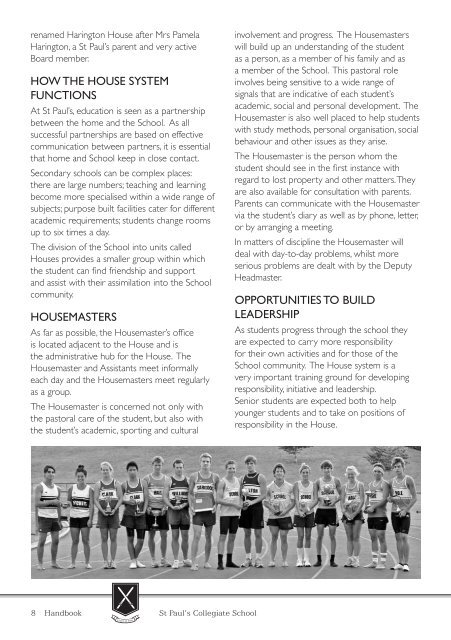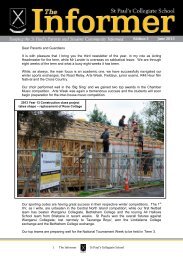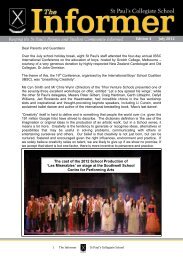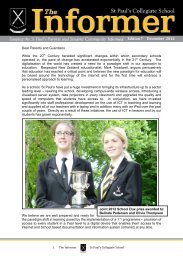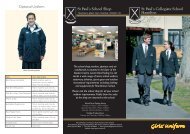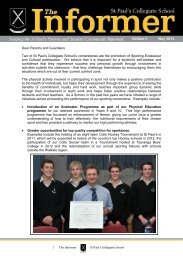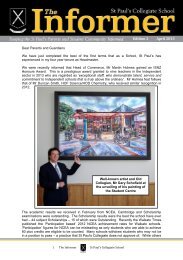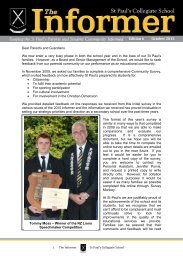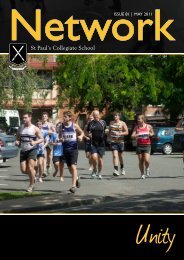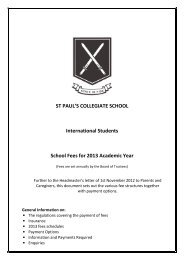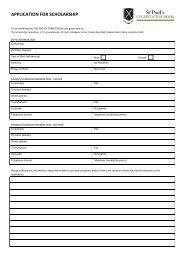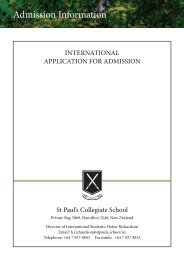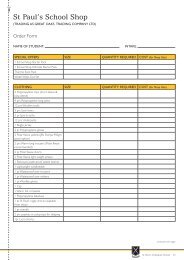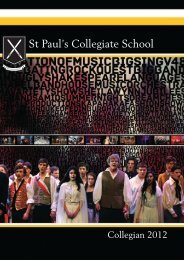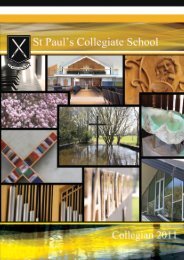St Paul's handbook Essential information - St Paul's Collegiate School
St Paul's handbook Essential information - St Paul's Collegiate School
St Paul's handbook Essential information - St Paul's Collegiate School
You also want an ePaper? Increase the reach of your titles
YUMPU automatically turns print PDFs into web optimized ePapers that Google loves.
enamed Harington House after Mrs Pamela<br />
Harington, a <strong>St</strong> Paul’s parent and very active<br />
Board member.<br />
How the House system<br />
functions<br />
At <strong>St</strong> Paul’s, education is seen as a partnership<br />
between the home and the <strong>School</strong>. As all<br />
successful partnerships are based on effective<br />
communication between partners, it is essential<br />
that home and <strong>School</strong> keep in close contact.<br />
Secondary schools can be complex places:<br />
there are large numbers; teaching and learning<br />
become more specialised within a wide range of<br />
subjects; purpose built facilities cater for different<br />
academic requirements; students change rooms<br />
up to six times a day.<br />
The division of the <strong>School</strong> into units called<br />
Houses provides a smaller group within which<br />
the student can find friendship and support<br />
and assist with their assimilation into the <strong>School</strong><br />
community.<br />
Housemasters<br />
As far as possible, the Housemaster’s office<br />
is located adjacent to the House and is<br />
the administrative hub for the House. The<br />
Housemaster and Assistants meet informally<br />
each day and the Housemasters meet regularly<br />
as a group.<br />
The Housemaster is concerned not only with<br />
the pastoral care of the student, but also with<br />
the student’s academic, sporting and cultural<br />
involvement and progress. The Housemasters<br />
will build up an understanding of the student<br />
as a person, as a member of his family and as<br />
a member of the <strong>School</strong>. This pastoral role<br />
involves being sensitive to a wide range of<br />
signals that are indicative of each student’s<br />
academic, social and personal development. The<br />
Housemaster is also well placed to help students<br />
with study methods, personal organisation, social<br />
behaviour and other issues as they arise.<br />
The Housemaster is the person whom the<br />
student should see in the first instance with<br />
regard to lost property and other matters. They<br />
are also available for consultation with parents.<br />
Parents can communicate with the Housemaster<br />
via the student’s diary as well as by phone, letter,<br />
or by arranging a meeting.<br />
In matters of discipline the Housemaster will<br />
deal with day-to-day problems, whilst more<br />
serious problems are dealt with by the Deputy<br />
Headmaster.<br />
Opportunities to Build<br />
Leadership<br />
As students progress through the school they<br />
are expected to carry more responsibility<br />
for their own activities and for those of the<br />
<strong>School</strong> community. The House system is a<br />
very important training ground for developing<br />
responsibility, initiative and leadership.<br />
Senior students are expected both to help<br />
younger students and to take on positions of<br />
responsibility in the House.<br />
8 Handbook <strong>St</strong> Paul’s <strong>Collegiate</strong> <strong>School</strong><br />
STATE IN FIDE


